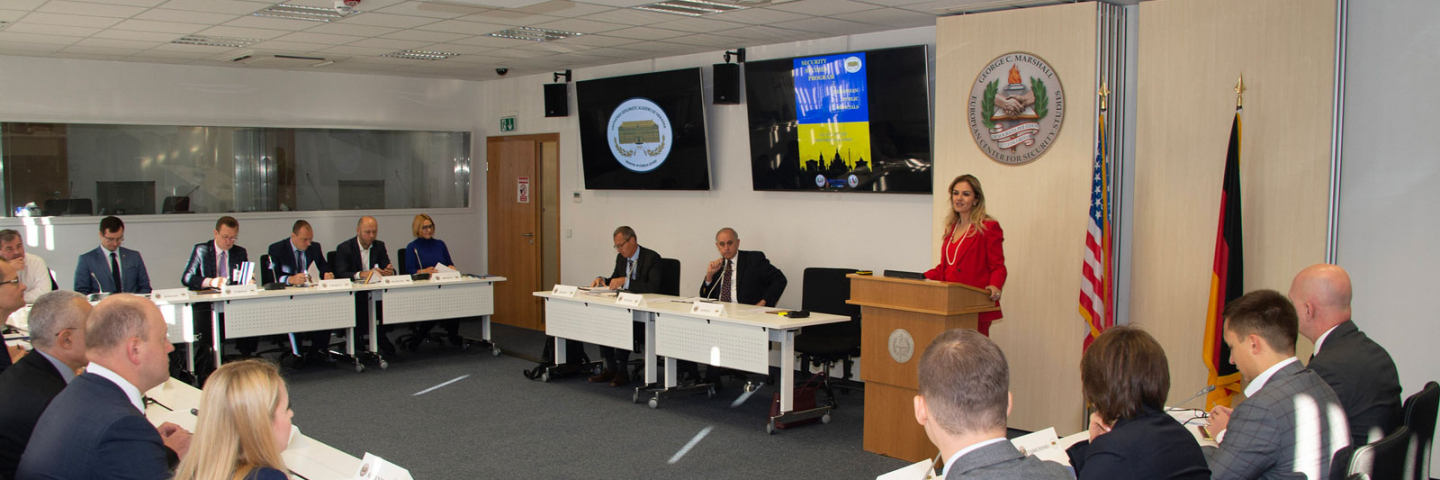
Marshall Center Hosts Security Studies Program for Ukrainian Public Officials
By Christine June
Public Affairs
George C. Marshall European Center for Security Studies
GARMISCH-PARTENKIRCHEN, Germany (Sept. 30, 2019) – Ukrainian Armed Forces Col. Vitalii Kuzmenko said the opportunity for him to attend the Security Studies Program for Ukrainian public officials will be useful for him in his daily job as the Chief of Bilateral Military Cooperation Directorate of the General directorate of Military Cooperation and Peacekeeping Operations of the General Staff of Ukrainian Armed Forces.
“I will use the knowledge and ideas I got from this program to assist Ukrainian General Staff officials to be better prepared for meetings with foreign officials,” he said. “I learned a lot from the open discussions, exchange of ideas, personal experiences and different points of view from the excellent subject matter experts and from my fellow classmates.”
The George C. Marshall European Center for Security Studies and the Diplomatic Academy of Ukraine held this Security Studies Program for Ukrainian public officials from Sept. 23 to 27 at the Marshall Center here.
“You are an inspiration to all,” said the Marshall Center Director retired U.S. Army Lt. Gen. Keith W. Dayton, referring not only to the 21 officials from across the Ukrainian government attending this program, but also to the 2019 elections and subsequent political changes in Ukraine.
“With your political achievements of this year, you have inspired us to even more enthusiasm in how we can support you,” said Dayton, who In November 2018, was appointed by then Secretary of Defense James N. Mattis as the Senior U.S. Defense Advisor to Ukraine. “You have the second largest alumni group of Marshall Center graduates and some of your organizations have been heavily trained here.”
There are 679 Marshall Center alumni, with only the U.S. having a larger number of graduates. The Marshall Center is a 26-year, German-American international security and defense institute and center of excellence for transnational security studies.
“The Marshall Center has been engaged in supporting Ukraine in its defense and security sector reforms through the capacity building of public servants since the Maidan Revolution in 2014,” said Dr. Valbona Zeneli, Marshall Center’s chair of Strategic Initiatives Department at the College of International and Security Studies.
As part of its comprehensive program with Ukraine, Zeneli said the Marshall Center has supported the reorganization of the Diplomatic Academy, which has been one of the main pillars of its partnership with the government of Ukraine.
Since the end of 2016, the Diplomatic Academy “Hennadii Udovenko,” which operates under the Ministry of Foreign Affairs of Ukraine, has become an institution of professional development for diplomats and civil servants in charge of international relations, research, and postgraduate training.
Topics for the first day of the Security Studies Program included foundations of U.S. and German Foreign policy, current changes in the international system with an emphasis on wider Europe, and Russian security policy and implications for Europe.
The Ukrainian officials began the second day by visiting the Marshall Center’s Program on Applied Security Studies for the lecture on the key features and current issues of the United Nations. They would again visit the PASS class on the third day for the lecture on key features and current issues of NATO, and on the fourth day to learn about the key features and current issues of the European Union.
Also on the second day, the officials heard from the Consul General Meghan Gregonis, from the U.S. Consulate Munich, on the future of transatlantic relations. Other topics on the second day were China’s rise and implications for the European security and Putin’s Fourth Term: Trends and Trajectories.
Sam Dewey, former staffer in the U.S. House of Representatives, shared the U.S. democratic oversight of the security sector and effective use of legislative budget authority in the security sector oversight during the program’s third day. Strategy considerations in the national security context was the other topic for the third day.
The rest of the fourth-day agenda included strategic communication and the challenge of information warfare, and maritime security.
“It was important for all of us, Ukrainians, to meet each other and to understand key objectives, culture and personnel mindset of each government institution involved in Ukraine’s security,” Kuzmenko said.